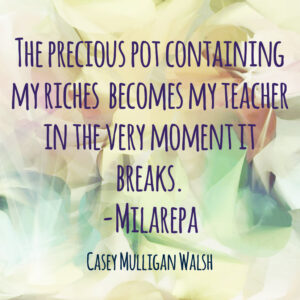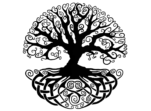Sometimes things go according to plan.
Then there was this essay, which I worked on for hours and hours, edited and fine-tuned and perfected. I had lots of encouragement from writing friends and felt sure it was both timely and timeless. Nevertheless, my timing was a little off–too close to Christmas, it seemed.
I thought of reshaping it into something that would work in the new year, yet sometimes there’s a piece whose time is clearly now.
So here it is…the fleshed out version of Embracing the In-Between, the topic we began discussing in November. I hope you’ll recognize other, non-holiday situations in your own life, times when you felt lost and uncertain and weren’t sure how things would ever work out.
I hope your holiday was perfectly imperfect, filled with opportunities to appreciate things just as they were despite it being a very different day than the one you’d planned. And I hope that, in the end, you enjoyed “surfing the void” as much as I did.
Embracing the In-Between, Take Two
Some languages—Icelandic among them—have names for more than four seasons. Those cultures do a better job of labeling the in-between, the “not still summer, not quite fall,” the “almost spring.”
If there were ever a time when we were collectively navigating the in-between, it’s now. As the pandemic drags on, the holidays approach, and we gradually understand this won’t be over anytime soon, many of us struggle to find comfort in an inherently uncomfortable place.
I hate the thought of waiting—waiting for nice weather to return so we can be outside again, waiting for a vaccine, waiting for leadership that guides more of us to wear masks and wash hands and remember we are indeed our brothers’ keepers.
Yet there are deeper losses, ones that, like most loss, are wrapped up in fear of the unknown.
We worry we will never return to the life we knew.
Stephen Sondheim’s musical, “Into the Woods” explores what happens when we stray from the path, triumph over fear, learn there are no guarantees or absolutes, and come out of the woods wiser, yet changed. The implications of that story are far beyond my ability to summarize or interpret them here, yet each time I’ve watched I’ve been left with the same sense of having learned something I can’t quite put my finger on.
Maybe what it sparks is the memory of the first Christmas after my mother died, when I was 12, only a year after my father’s passing. My first Christmas as an orphan. Surrounded, in this new life with my aunt’s family, by the trappings of their holiday, I perfected the art of looking perfectly comfortable on the outside while I was sad and lonely on the inside. The carefully decorated Christmas tree my big brother had helped my ailing mother set up, the lovingly selected gifts only they would know I’d cherish, these were replaced by someone else’s tree, someone else’s holiday. I’d ventured into my own formidable woods, and I had no idea how I’d ever find my way out.
I stumbled through my teens, looking for the path and sometimes finding it. At 20, I married and set about creating a family of my own. Later, when considering whether to have a third child, I imagined future holidays: When two come home with their families, it’ll be fun, but three will be a party! With the hubris of a young mother, sure things would work out just as she planned, I was certain I’d ensured I would never again feel alone.
Then my oldest child died at 20. A divorce further altered the family I’d pictured. Now I was deep in the muck of the worst sort of in-between, where fear and grief collide.
Yet my remarriage, several years later, brought two more kids into the fold.
One by one the grandkids arrived, until our house often felt way more than half full.
Mission amended. Mission accomplished.
I look around our home today, which for more than 16 years has always stood ready for grandkids of all ages. The “formal living room” and kids’ bedroom overflow with art supplies and books, building sets and baby dolls in bassinets. We have dinner seating for at least a dozen and folding tables for larger crowds.
Yet this year, as we plan for the holidays, we understand that nothing will be as it has been in the past. Family won’t be traveling from hours away or even down the street to celebrate with us.
Sometimes it feels as though the rooms will always be as quiet as they are now.
I wake up in the night and my fear is palpable. I dip into grieving the death of the rhythm of family gatherings nearly as deeply as the many times I’ve grieved the actual deaths of those I’ve loved. I worry that, like in those times, the life I’ve clung to–even as I’ve acknowledged its imperfections–will never return, no matter how determined I might be to make that happen. I’m at a loss for what to picture in their place.
William Bridges calls this space “the neutral zone,” the time between the old sense of identity and the new one, when people are in flux and may feel confusion and distress. Some of us want to jump ahead to the next place, and some of us try to retreat into the past, no matter how impossible that may be. Yet, he tells us, the neutral zone is the seedbed for new beginnings.
While I know that growth comes from change, that change can be good, I also I know I’m not alone in my trepidation. I understand that while my fears are personal to me, others have different fears that are equally impactful for them. Whether it’s concerns over income or relationships or worries over our children’s educations or health, it all boils down to a feeling of instability. We’ve lost our position in space, can’t remember what life was like “before,” and have no real way of knowing what our “after” will look like.
All of these feelings are normal.
Then I heard about the bardo.
In Tibetan Buddhism, bardo refers to “a state of existence between death and rebirth, varying in length according to a person’s conduct in life and manner of, or age at, death.” But it can also more broadly refer to an “intermediate state,” in which we have lost our old reality and it is no longer available to us.
Boom! There it is. Lost. No longer available. There are no other words that strike greater fear in my heart. Too many times that has been my reality. Too many times, I’ve fought my way back. I don’t welcome doing it again.
“The more we learn to recognize this sense of disruption, the more willing and able we will be to let go of this notion of an inherent reality,” writes Pema Khondro Rinpoche. “If we can gain freedom from the eternal grasping onto ‘who I am’ and ‘how things are’–our default mode–then we can get on to the business of being. Until now, we have been holding on to the idea of an inherent continuity in our lives, creating a false sense of comfort for ourselves on artificial ground. By doing so, we have been missing the very flavor of what we are.”
For more than two decades, I’ve struggled to articulate the feeling I had in the years leading up to my son’s death, when everything I’d known and believed about my own life—who I could count on and what I could expect—was questioned and shaken and, in some cases, destroyed entirely.
I see my younger self, mid-divorce, sitting alone in the middle of a silent house another Christmas afternoon, and those feelings flood back as though it were yesterday. I’m no one’s mother, no one’s wife. I haven’t been anyone’s daughter or sister for decades. Who am I supposed to be now? Is this all there is?
But as time passed and I understood there was indeed no path back to the life I’d thought I’d built, I found freedom in embracing an entirely new perspective about who I was and how I fit into the world. This new, no-matter-what-comes faith not only got me through a frightening transition, it continues to bring me joy and inform the way I see the world today.
Not that I don’t muck around in the weeds. I do, and sometimes in a big way. Then I take a beat and work at remembering the things I’ve forgotten: Living in the past or the future has never been the answer.
What remains, as Rinpoche says, is not the void I fear, but “a new moment spontaneously meeting us again and again.”
I began to see that naming this place has given me permission to sit with it rather than fight it more often than not. Perhaps as we learn to live in the neutral zone, soak in the consciousness of the bardo, take that hero’s journey into the woods, we’ll come out wiser yet changed. We’ll begin to embrace the unknown in ways we may not have been forced to in the past. Perhaps as we let go of that false sense of inherent continuity in our lives–the “who I am” and “how it is” we’ve come to expect–we’ll come out on the other side with a deeper sense of who we are in the quiet.
For now, enthusiasm is mounting for “Plan B” holidays in our house. The quiet rooms still overflow with toys and books, awaiting their children. The tables stand at the ready. Yet this year, we’ll enjoy a hike, just the two of us, fancy takeout (a reprieve from days of cooking and cleanup), and a movie or two cuddled up on the sofa to cap things off.
No one ever said we couldn’t have fun while we’re surfing the void.



“We’ve lost our position in space, can’t remember what life was like “before,” and have no real way of knowing what our “after” will look like.”
You’ve nailed it! We are trying to avoid “the void” by believing (and likely correctly), that “this now” with insolation at the root of everything we attempt to do, is not permanent so we try not to get “used” to it. I hate the term “the new normal” because I honestly don’t believe there is such a thing as normal. The next moment has always been unknown, only now, they seem magnified because of the uncertainty. I think I’m rambling, so I’ll stop, but this piece has truly given me pause for thought!
Wonderful words of wisdom, Casey. Your writing style reminds me of Anna Quindlin’s… one of my favorite authors.
Keep going, Girl!
The pandemic has put us in a neutral zone as you describe for past life tragedies you have experienced.I feel the optimism at the end of your story.It makes me look forward to the normal life we had before the virus put me in the neutral zone..